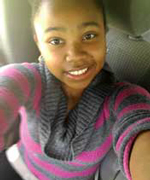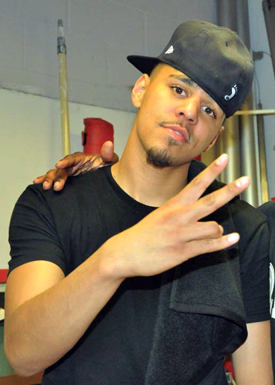Good Rap, Bad Rap and what it means to youth
By Kopano Muhammad | Last updated: Jan 21, 2013 - 7:32:56 PMWhat's your opinion on this article?

Kopono Muhammad
|
His music is something that I would describe as pure genius.
Now, this isn’t meant to be a biography. It’s certainly not a devoted tribute to (in my opinion) one of the greatest rappers of all time. This is a simple article that I hope makes you think. Hip hop or otherwise known as rap music originated from the South Bronx of New York during the 1970s. It was well known throughout the New York streets. It was used to describe and talk about what was really going on in the Black community. At first it was good, it was cool. The beats easy, simple and were dope as ever. Lyrics were even more impressive. If you could rap in your neighborhood you were made.

J. COLE
|
Rap music had been thought of very favorably in the Black communities. But now it has branded itself a bad name. Parents of any race do not approve of this type of “hoodlum” music. It’s thought of to be shameful, and bad representation of the community that it originated from.
What used to be an expression of hardship has been turned into music about gangs, sex, drugs, alcohol, and partying.
If you were to listen to the lyrics of one of the most popular songs right now, it would sound a little something like this, “All I want for my birthday is a big booty hoe,” or “Bands will make her dance,” and even more provocative phrases that probably should never be spoken even though they are. They are spoken, listened to, and repeated by everyone.
Rap music continuously degrades women—calling them words that no one used to want to be associated with at all. Now Black girls go around calling themselves a “Bad B----h” as if in any way shape or form that is a good thing. Rappers have now convinced women that turning your clothes into strips of cloth is beautiful. That whatever hair is not yours is beautiful. That giving yourself up easily is beautiful. And I could have sworn that is not the meaning of beauty that my parents taught me. It’s told our young men that using girls is right. That going out into the streets killing each other is cool. Encouraging youth to get involved in the drug game, which honestly, is not a game at all. Now our men want to do manly things, without paying the manly consequences.
As I drone on and on about the history and facts of rap, you’re probably thinking, “Okay Little Girl what is your point?” My point is that rap music has slowly become corrupted over the years. But honestly it’s not all bad.
J. Cole is the first rapper I wanted to mention because his music is what inspired me to write in the first place. Jermaine Lamarr Cole grew up without a father, raised single-handedly by his mother. He experienced the struggle of growing up Black and that’s what his music is all about. Cole raps about how Black girls are lowering themselves and how they struggle with life. He encourages them to move on: “Now girl you is fine, ain’t no doubt about it, but why else you think he hit it and forgot about it? It’s cause your mind do not match what your a-- got. But cheer up; you gotta be your own mascot.” Cole reminds our young females that we are all we’ve got, and that we can measure up to things beyond our imagination. But that’s only if we let ourselves. Cole’s music speaks of things Blacks go through on a daily basis, from being pulled over by a policeman for our race to struggling with depression.
Another inspirational rapper would be Big Sean. Sean is mostly known for his more inappropriate music but there are a lot of inspirational songs he has written that many people do not know about. Sean mainly talks about how he always wanted to be famous, how he wanted everyone to know his name, his lyrics, and what he is all about. Now he is escalated to such a high point in fame that he does not like it. His music speaks of dealing with figuring out who he can and cannot trust and how much he misses his past. His life was once so simple but even then things were not perfect. In one of his songs he tells us how his friend got hooked on drugs and how he cannot deal with it.
Rap music has slowly evolved into different things. While mainly adults are appalled by the musical content played on the radio, many teens are entertained by it. If you think about it, there is bad rap music out there, but there’s good rap music out there too. It is just yet to be discovered. Rap music has helped a lot of teens in many ways—helped us find our ways out of difficult situations, using the lyrics to relate to our lives and finding a meaning in them. Those words help us understand the world and help us understand ourselves. It’s something for us to fall back on. When everything is slowly crashing down, we have our music to rely on to always be there. It’s something that we can relate to when we feel like no one else can.
Kopano Muhammad is a 14-year-old writer from Chicago and the daughter of Final Call editor Richard B. Muhammad.
INSIDE STORIES AND REVIEWS
-
-
About Harriett ... and the Negro Hollywood Road Show
By Rabiah Muhammad, Guest Columnist » Full Story -
Skepticism greets Jay-Z, NFL talk of inspiring change
By Bryan 18X Crawford and Richard B. Muhammad The Final Call Newspaper @TheFinalCall » Full Story -
The painful problem of Black girls and suicide
By Charlene Muhammad -National Correspondent- » Full Story -
Exploitation of Innocence - Report: Perceptions, policies hurting Black girls
By Charlene Muhammad -National Correspondent- » Full Story -
Big Ballin: Big ideas fuel a father’s Big Baller Brand and brash business sense
By Bryan Crawford -Contributing Writer- » Full Story






 Click Here Stay Connected!
Click Here Stay Connected!








